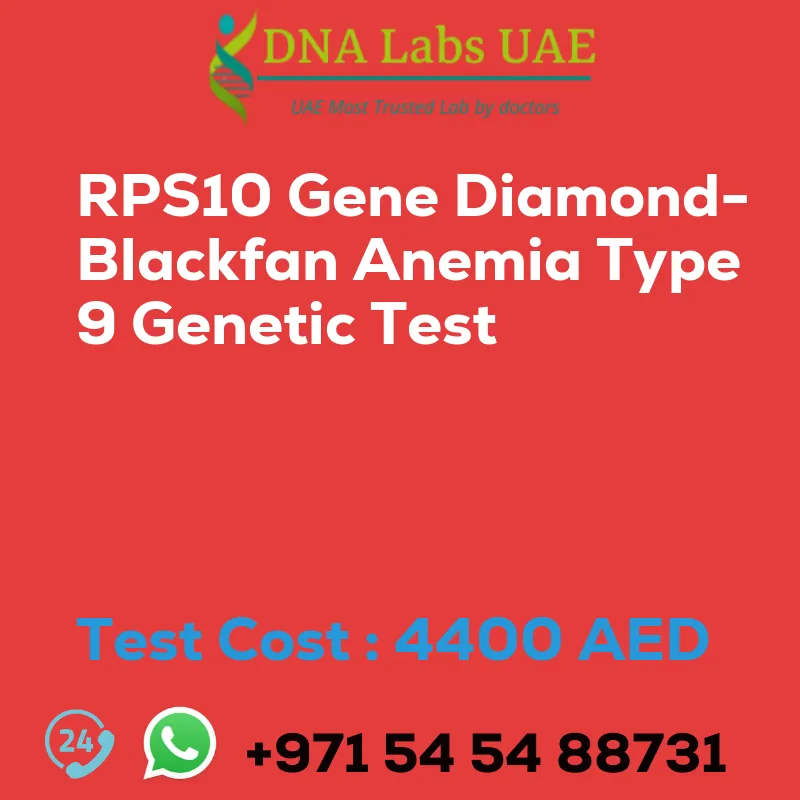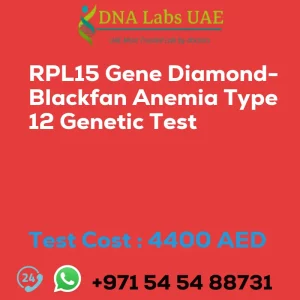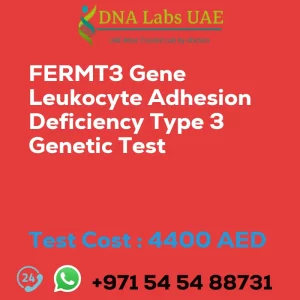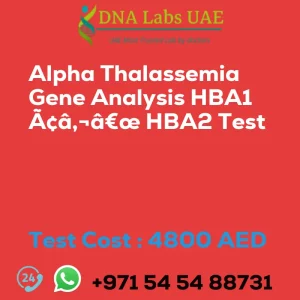RPS10 Gene Diamond-Blackfan anemia type 9 Genetic Test
Are you concerned about Diamond-Blackfan anemia type 9 (DBA9)? DNA Labs UAE offers a comprehensive genetic test to diagnose this rare genetic disorder. With a price of 4400.0 AED, our RPS10 Gene Diamond-Blackfan anemia type 9 Genetic Test can provide valuable insights into the condition.
Test Details
The RPS10 gene is associated with Diamond-Blackfan anemia type 9 (DBA9), a disorder characterized by a lack of red blood cell production. To diagnose DBA9, we utilize Next-Generation Sequencing (NGS) technology. NGS allows for the simultaneous analysis of multiple genes or the entire genome.
Our NGS test specifically targets the RPS10 gene to identify any mutations or variations that may be causing the disorder. The test involves collecting a sample of DNA, which can be obtained through a blood sample or a cheek swab. The collected DNA is then sequenced using NGS technology, generating a large amount of genetic data.
Our team of geneticists analyzes this data and compares it to reference sequences to identify any variations or mutations in the RPS10 gene. If a mutation or variation is detected, it confirms a diagnosis of DBA9.
Test Components
- Price: 4400.0 AED
- Sample Condition: Blood or Extracted DNA or One drop Blood on FTA Card
- Report Delivery: 3 to 4 Weeks
- Method: NGS Technology
- Test Type: Hematology
- Doctor: Hematologist
- Test Department: Genetics
Pre Test Information
Before undergoing the RPS10 Gene Diamond-Blackfan anemia type 9 Genetic Test, it is important to provide the clinical history of the patient. Additionally, a Genetic Counselling session will be conducted to draw a pedigree chart of family members affected by the RPS10 Gene Diamond-Blackfan anemia type 9 NGS Genetic DNA Test gene RPS10.
Importance of Genetic Testing
Genetic testing for DBA9 and other genetic disorders should always be performed by qualified healthcare professionals, such as geneticists or genetic counselors. These professionals can interpret the results and provide appropriate guidance and support.
Understanding the underlying cause of a genetic disorder, like DBA9, is crucial for making informed treatment decisions and providing genetic counseling to affected individuals and their families.
Don’t let genetic disorders remain undiagnosed. Contact DNA Labs UAE today to schedule your RPS10 Gene Diamond-Blackfan anemia type 9 Genetic Test and gain valuable insights into your health.
| Test Name | RPS10 Gene Diamond-Blackfan anemia type 9 Genetic Test |
|---|---|
| Components | |
| Price | 4400.0 AED |
| Sample Condition | Blood or Extracted DNA or One drop Blood on FTA Card |
| Report Delivery | 3 to 4 Weeks |
| Method | NGS Technology |
| Test type | Hematology |
| Doctor | Hematologist |
| Test Department: | Genetics |
| Pre Test Information | Clinical History of Patient who is going for RPS10 Gene Diamond-Blackfan anemia type 9 NGS Genetic DNA Test. A Genetic Counselling session to draw a pedigree chart of family members affected with RPS10 Gene Diamond-Blackfan anemia type 9 NGS Genetic DNA Test gene RPS10 |
| Test Details |
The RPS10 gene is associated with Diamond-Blackfan anemia type 9 (DBA9), which is a rare genetic disorder characterized by a lack of red blood cell production. To diagnose DBA9, a Next-Generation Sequencing (NGS) genetic test can be performed. NGS is a high-throughput sequencing technology that allows for the simultaneous analysis of multiple genes or the entire genome. In the case of DBA9, the NGS test would specifically target the RPS10 gene to identify any mutations or variations that may be causing the disorder. The NGS test involves collecting a sample of DNA, typically through a blood sample or a cheek swab. The DNA is then sequenced using NGS technology, which generates a large amount of genetic data. This data is analyzed by geneticists and compared to reference sequences to identify any variations or mutations in the RPS10 gene. If a mutation or variation is detected in the RPS10 gene, it can confirm a diagnosis of DBA9. This information is crucial for understanding the underlying cause of the disorder and can help guide treatment decisions and genetic counseling for affected individuals and their families. It is important to note that genetic testing for DBA9 and other genetic disorders should be performed by qualified healthcare professionals, such as geneticists or genetic counselors, who can interpret the results and provide appropriate guidance and support. |








